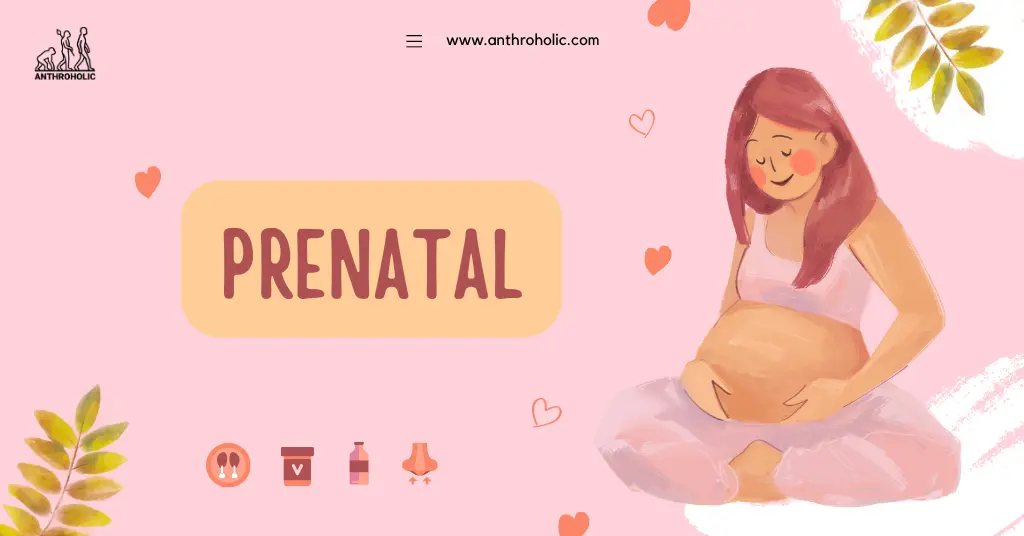AI Answer Evaluation Platform Live Now. Try Free Answer Evaluation Now
Prenatal
The prenatal period is a crucial stage in human development, setting the foundation for health in later life. This phase, encompassing the time from conception until birth, has been a subject of extensive study, particularly in the field of biological anthropology. Biological anthropologists, with their focus on the intersection of human biology, culture, and environment, provide a unique lens through which to understand prenatal care.

Biological Anthropology and Prenatal Care
Biological anthropology’s unique perspective enables a comprehensive approach to prenatal care, involving understanding genetic and non-genetic factors influencing prenatal development.
- Genetic Factors: These involve the study of inherited characteristics and how they may influence prenatal development. For instance, genetic disorders can greatly affect fetal development [1].
- Non-Genetic Factors: These include maternal health, nutrition, stress levels, and exposure to harmful environmental factors. Each of these elements can have significant impacts on the development of the fetus [2].
Maternal Health and Nutrition
One of the key factors influencing prenatal development is the mother’s health status. Maternal diseases like diabetes and hypertension can potentially affect fetal growth. Similarly, poor nutrition can lead to inadequate growth and development of the fetus.
| Factors | Impact on Prenatal Development |
|---|---|
| Poor Maternal Nutrition | Inadequate fetal growth, low birth weight |
| Maternal Illnesses | Potential birth defects, low birth weight |
| Maternal Stress | Preterm birth, low birth weight |
The above table illustrates the influence of various maternal health factors on prenatal development [3].
The Biological Anthropology of Pregnancy and Birth
Biological anthropology, with its holistic understanding of human biology in conjunction with cultural and environmental contexts, presents a unique angle on the understanding of pregnancy and birth.
Cross-cultural Perspectives on Prenatal Care
Biological anthropologists also analyze prenatal care across different cultures and societies. In many traditional societies, prenatal rituals and customs provide support and care to the pregnant woman, often addressing both physical and emotional wellbeing. The comparison of these traditional practices with modern medical approaches to prenatal care can offer valuable insights and potential improvements in care strategies.
Fetal Programming and Epigenetics
One emerging research area in prenatal care is fetal programming and epigenetics. The concept of fetal programming suggests that the conditions and environment experienced in the womb can shape an individual’s health and development throughout life.
Epigenetic changes, on the other hand, refer to modifications in gene expression rather than alterations in the genetic code itself. These changes can be influenced by prenatal factors such as maternal stress, nutrition, and environmental exposure.
Understanding these concepts allows us to better grasp the long-term health consequences of prenatal conditions, contributing to a more comprehensive approach to prenatal care.
Prenatal Care: The Best Practices
Given the significance of the prenatal period, proper care is essential. Some best practices include:
- Regular medical check-ups to monitor the health of the mother and fetus.
- Proper nutrition, including adequate intake of vitamins and minerals.
- Mental health care to manage stress levels.
- Avoidance of harmful substances like alcohol, tobacco, and drugs.
- Access to and education about prenatal care, particularly in underprivileged communities.
The Future of Prenatal Care
With the growing knowledge and research in the field of biological anthropology, prenatal care is evolving. Some potential future directions include:
- Personalized Prenatal Care: With advances in genetic testing and understanding of individual genetic variations, personalized prenatal care could become a reality, adjusting care strategies based on the unique genetic makeup of the mother and fetus.
- Integrating Traditional and Modern Care: Learning from traditional prenatal practices across cultures can provide holistic approaches, integrating emotional and social care with medical aspects.
- Policy and Public Health Interventions: With the understanding of socio-cultural and environmental impacts on prenatal development, there’s a stronger push for policy interventions to ensure equal access to quality prenatal care for all.
Conclusion
In conclusion, the prenatal period is a critical time, shaping the foundation of an individual’s life. Biological anthropology’s comprehensive approach, combining genetic, environmental, and socio-cultural aspects, offers crucial insights into optimizing prenatal care. As we deepen our understanding and integrate new research findings, we can hope to see more holistic, personalized, and equitable prenatal care strategies in the future.
References
[1] American Pregnancy Association. (2021). Genetic Disorders and Birth Defects in Pregnancy.
[2] Buss, C., Davis, E.P., Muftuler, L.T., Head, K., & Sandman, C.A. (2010). High pregnancy anxiety during mid-gestation is associated with decreased gray matter density in 6–9-year-old children. Psychoneuroendocrinology.
[3] Godfrey, K. M., Reynolds, R. M., Prescott, S. L., Nyirenda, M., Jaddoe, V. W., Eriksson, J. G., & Broekman, B. F. (2017). Influence of maternal obesity on the long-term health of offspring. The Lancet Diabetes & Endocrinology.




